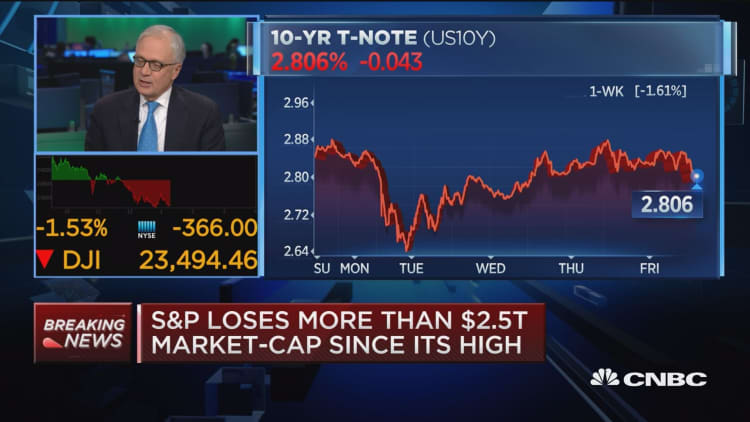
There's reason to be concerned about bond vigilantes, who are no longer under "lock and key" and are free to push yields higher, Wall Street veteran Ed Yardeni told CNBC on Friday.
Yardeni, a market historian, coined the term "bond vigilantes" in the 1980s to refer to investors who sell their holdings in an effort to enforce fiscal discipline. Having fewer buyers drives prices down — and drives yields up — in the fixed-income market. That, in turn, makes it more expensive for the government to borrow and spend.
"They had been sort of put under lock and key by the central banks. The Fed had lowered interest rates down to zero in terms of short-term rates and that pushed bond yields down. And then they bought up a lot of these bond yields," said Yardeni, president of Yardeni Research.
Now the Fed is slowly raising interest rates and starting to unwind its balance sheet. On top of that, new tax cuts were passed and a massive spending deal was just signed into law.
"Now people are looking more at the domestic situation and saying, 'You know what, maybe we need a higher bond yield,'" Yardeni said in an interview with "Power Lunch."
"They've saddled up, and they're riding high. The posse is getting ready. They're getting the message out."
Bond vigilantes last made their mark during the Clinton administration, when a bond market sell-off forced President Bill Clinton to tone down his spending agenda.
Yardeni said while Clinton got the message back then, he doesn't think the Trump administration has this time around.
On Friday, President Donald Trump signed a massive budget plan into law that provides a $300 billion spending boost on military and domestic programs.
And late last year, the Republican tax cut was enacted that will add more than $1 trillion to federal budget deficits over a decade.
However, Yardeni isn't convinced the deficit will have a big impact on the bond market.
"You look back historically and the deficit really hasn't been as influential as you would think in determining the bond yield. It's really been much more inflation," he said.
However, he doesn't think inflation is coming back.
He ultimately sees the 10-year Treasury hitting 3 percent or 3.5 percent. The benchmark note was at 2.838 on Thursday, after hitting a 4-year high on Monday when it flirted with 2.885 percent.
— CNBC's Jeff Cox contributed to this report.


